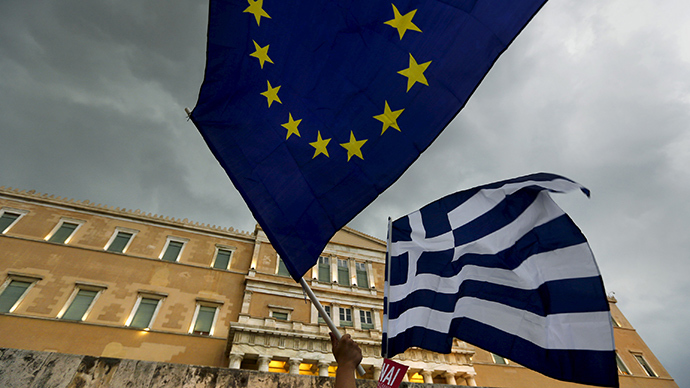IMF: Greek debt ‘unsustainable,’ Europe should give relief – report

European creditors should either write down a massive amount of Athens’ debt or give Greece a 30-year grace period if they want it to recover and repay, according to a Reuters’ report citing International Monetary Fund (IMF) officials and a secret study.
Taking into account Greece’s growing financial needs, its debt
situation is “unsustainable,” according to the latest
IMF projections contained in a confidential report obtained by
Reuters. The new data, sent by the IMF to EU governments late on
Monday after a new Greek bailout plan was agreed upon in
principle, states that the 86-billion-euro program will not save
Greece from financial collapse.
The updated debt sustainability analysis, which is said to have
been released by the fund now that several media outlets have
leaked the data, calls for a considerable portion of the Greek
debt to be written off.
“The dramatic deterioration in debt sustainability points to
the need for debt relief on a scale that would need to go well
beyond what has been under consideration to date – and what has
been proposed by the ESM [European Stability Mechanism bailout
fund],” the IMF paper says.
READ MORE: Athens extends ‘bank holidays’ as ECB keeps its emergency aid limit unchanged - source
According to the leaked study, Greece’s debt will peak at nearly
200 percent of economic output in the next two years, standing at
170 percent of GDP even by 2022. Previously published estimates
had put the figures at 177 percent and 142 percent respectively.
The IMF now estimates that Athens’ gross financing needs will
rise above the “safe” 15 percent of GDP threshold and
continue rising in the long term. Moreover, even those
projections “remain subject to considerable downside
risk,” the study said
A 30-year grace period on servicing the Greek European debt,
including new loans, would have to be provided by the European
creditors, as well as a significant maturity extension, the IMF
believes. Otherwise, the creditors would have to make annual
fiscal transfers to the Greek budget or accept “deep upfront
haircuts” on their loans, the report says.
READ
MORE: Greek Oxi-moron: When Bailout Means Servitude (OP-ED)
Greece is in need of much greater debt relief than European
governments are willing to acknowledge, and this measure is
needed to let the Greek economy recover, a senior IMF official
told Reuters late on Tuesday.
“I don’t think this is a gimmick or kicking the can down the
road…This is a dramatic measure to take the entire European stock
[of debt] and reprofile it,” for Greece to have a chance of
“getting some growth back,” the official said on condition
of anonymity.
For the IMF to remain involved in financial aid for Greece, its
debt must be deemed “sustainable” by the fund –
something which the latest study does not believe possible.
“Borrowing at anything but AAA rates in the near term will
bring about an unsustainable debt dynamic for the next several
decades,” the paper says, challenging the assumption voiced
by some European officials that in 2018 Greece will already be
able to meet some of its financing needs by going to the markets.
The publication of the IMF report comes on the heels of other
disclosures, such as German Finance Minister Wolfgang Schaeuble
revealing that some members of the government in Berlin would
have preferred that Greece take a “time-out” from the eurozone
rather than give it another bailout.
Meanwhile, the new debt sustainability figures for Greece had
reportedly been given to European finance ministers on Saturday –
well before the Monday deal was concluded.
READ MORE: ‘Agree or go bust’: Tsipras explains, defends ‘bad’ bailout deal ‘imposed’ on Greece
The timing of the leak coincides with Greek Prime Minister Alexis
Tsipras’s attempt to convince his parliament that accepting the
deal is the only option if Greece is to remain in the euro and
avoid economic collapse.
Tsipras gave a live TV interview defending the deal ahead of
Wednesday’s parliamentary session that is to decide the issue.
The outcome of the vote is far from certain, with many of the
Syriza leader’s fellow party members unhappy with the new bailout
plan.
While revealing he “does not believe in” the bailout
plan, Tsipras argued that the deal was the only way for Greece to
stay in the EU – something that he said was a “one way street”
option imposed on the Greeks. However, he claimed that he had
still managed to win certain concessions such as avoiding wage
and pension cuts and securing ‘fresh money’ from European states.












